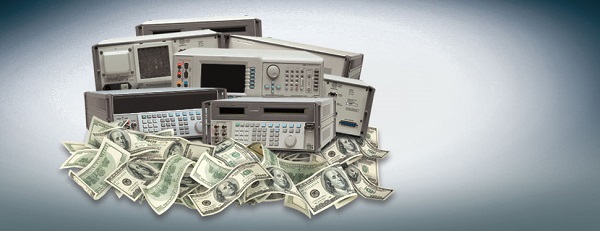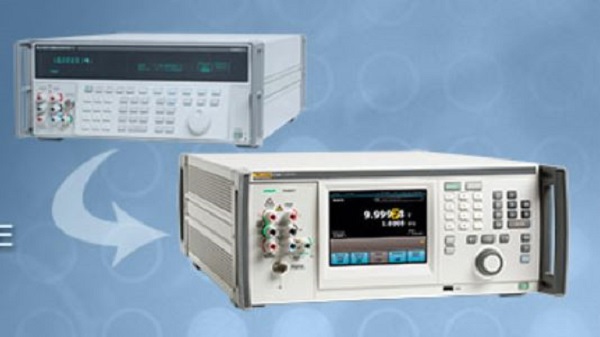- Other Fluke companies:
- Fluke
- Fluke Biomedical
- Fluke Networks
- Fluke Process Instruments
How End-of-Life Calibrators Can Help You Upgrade to the Newest Technology and Reduce Production Risks

One of the qualities of Fluke Calibration test and measurement equipment is excellent longevity. With regular care and maintenance, Fluke calibrators can last for many years and become staples of the calibration lab. Moreover, many of our customers pride themselves on their ability to repair older equipment, making Fluke Calibration products assets that provide a return on investment for decades.
When we say a calibrator is “end of life” or "end of service" it can be easy to assume we mean any calibrator that isn’t working and can’t be fixed. However, these calibrators can be used every day. That being said, I’d like our customers to know owning a calibrator that has reached end-of-life or end-of-service status not only presents some serious risks to your business or workflow, but can hold your calibration lab back from enjoying some of the latest technology available in newer models.
What Is the Difference Between “End of Life” and "End of Service"?
A Fluke Calibration instrument deemed end of life means that it has been discontinued; that is, it is no longer being manufactured or sold. Fluke Calibration typically offers extended service support for five years following the end-of-life date. During that time, Fluke will continue to offer service and repair for as long as there are spare parts available. After that five-year period is over, the product has reached its end-of-service (or end-of-extended-support) date.
While an end-of-service calibrator can still perform calibrations, you may be unable to get any repairs if it malfunctions. An unscheduled stoppage becomes more likely with older equipment, and not having replacement instruments available can stop your workflow for weeks or months -- and that is very bad for any business.
I estimate about one in three of my customers owns a piece of equipment that is end-of-life. When I ask about the history of that product, they tell me it comes back from repairs, or they have a spare of the unit and aren’t concerned. While that longevity is a great attribute for that equipment, when it’s officially end of life, they could experience a non-repairable failure without notice. That equipment is living on borrowed time, and a failure outside of service life can have a severe negative impact on their calibration customers, be they internal customers or third parties. Depending on the size of the company, it can take up to a year to allocate budget for a new calibrator.
Planning for Calibrator End-of-Life Minimizes Risk
To reduce the risk of downtime, the first step is to understand when your equipment reaches its end-of-life cycle. At the end of this post, there’s a table of some common equipment and when it reaches the end of service. Even if your calibrator is still within its service life, now is a great time to prepare for when it’s not.
While it might be tempting to find used equipment to replace or obtain spares, often at a fraction of the cost of a new calibrator, this can incur its own risks. When you buy used, you don’t know the history of the unit. It might only be listed on the used market because it has a history of problems. I have seen customers attempt to pay less than the cost to buy a new unit, only to discover their used-equipment purchase is completely non-functional. They ended up with a useless calibrator, and still had to buy a new one.
The tables below show outdated calibrator models and their suggested replacements.
Electrical Calibration Models |
||
|
Calibrator Model |
End-of-Service Date |
Suggested Replacement |
|
5820A Oscilloscope Calibrator |
June 30, 2020 |
|
|
7001 10-Volt Solid State DC Voltage Reference |
Beyond end of service |
|
|
5700A Series I Multifunction Calibrator (pre-1995) |
June 30, 2020 |
|
|
5520A High Performance Multi-Product Calibrator |
Beyond end of service |
|
|
9100 Universal Calibration System |
Beyond end of service |
|
|
5500A High Performance Multi-Product Calibrator |
Beyond end of service |
|
|
2620A/2625A Hydra Series Data Acquisition Unit |
Beyond end of service |
|
|
2635A Hydra Series II Data Bucket |
31-Dec-18 |
|
|
5700A/5720A Series II Multifunction Calibrator |
June 30, 2020 |
|
|
9640A and 9640A/LPNX Series RF Reference Source |
15-Feb-20 |
|
|
5790A AC Measurement Standard |
31-Jul-20 |
|
|
2640A / 2645A NetDAQ |
31-Dec-23 |
|
|
732B and 734A DC Voltage Reference Standard |
31-Dec-23 |
|
|
5320A Multifunction Electrical Tester Calibrator |
30-Jun-24 |
Temperature Calibration Models |
||
|
Calibrator Model |
End-of-Service Date |
Suggested Replacement |
|
1521 Handheld Thermometer |
Beyond end of service |
|
|
1522 Handheld Logging Thermometer |
Beyond end of service |
|
|
1575A Super-Thermometer |
Beyond end of service |
|
|
1590 Super-Thermometer |
Beyond end of service |
|
|
7100 Cold Bath (-100 C) |
Beyond end of service |
|
|
9112B Thermocouple Furnace |
1-Jan-20 |
|
|
9141 Field Dry Well |
1-Jan-20 |
Pressure Calibration Models |
||
|
Calibrator Model |
End-of-Service Date |
Suggested Replacement |
|
Pressure Indicators, Reference Pressure Monitors |
||
|
RPM1 DHI legacy reference pressure monitor |
Beyond end of service |
|
|
RPM2 DHI legacy reference pressure monitor |
Beyond end of service |
|
|
RPM3 DHI legacy reference pressure monitor, including HGC-30000-AF hydraulic gauge calibrator |
Beyond end of service |
RPM4 Reference Pressure Monitor, including HGC-30000-AF-2 hydraulic gauge calibrator |
|
62xx series Ruska legacy portable pressure gauge |
Beyond end of service |
|
|
6000DDR Ruska legacy digital pressure indicator |
Beyond end of service |
|
|
7220 Ruska legacy single-channel pressure indicator |
Beyond end of service |
|
|
7222 Ruska legacy dual-channel pressure indicator |
Beyond end of service |
|
|
7230 Ruska legacy single-channel high-pressure indicator |
Beyond end of service |
|
|
7222 Ruska legacy dual-channel high-pressure indicator |
Beyond end of service |
|
|
Automated Pressure Controllers/Calibrators |
||
|
PPC1 DHI legacy pressure controller/calibrator |
Beyond end of service |
|
|
PPC2+ DHI legacy pressure controller/calibrator |
Beyond end of service |
|
|
PPC3 DHI legacy pressure controller/calibrator, including PPC3-AF, PPC3-200K BG15Kp, and PPC3-100K A116Ks/BG15Ks on early-model ADCS-601 systems |
Beyond end of service |
|
|
PPCK DHI legacy high-pressure controller/calibrator |
Beyond end of service |
|
|
PPCK+ DHI legacy high-pressure controller/calibrator |
Beyond end of service |
|
|
6010 Ruska legacy digital pressure controller |
Beyond end of service |
|
|
7010 Ruska legacy digital pressure controller |
Beyond end of service |
|
|
7210 Ruska legacy digital pressure controller |
Beyond end of service |
|
|
7215, 7215i, 7215xi Ruska legacy digital pressure controllers |
Beyond end of service |
|
|
7310 Ruska legacy digital high-pressure controller |
Beyond end of service |
8270A and 8370A Modular High-Pressure Controllers/Calibrators |
|
7610 Ruska legacy digital hydraulic pressure controller |
Beyond end of service |
|
|
6610, 6660, 7710 Ruska legacy air data test set |
Beyond end of service |
|
|
Primary Pressure Standards |
||
|
2485 Ruska legacy hydraulic piston gauge |
Beyond end of service |
|
|
2400 series Ruska legacy hydraulic deadweight gauge, including 120X table system |
Beyond end of service |
|
|
2450, 2451, 2452, 2453, 2480, 2481, 2492, 5000 series Ruska legacy hydraulic deadweight gauges |
Beyond end of service |
|
|
2475 Ruska legacy high-pressure gas piston gauge |
Beyond end of service |
|
|
Ruska legacy piston gauge accessories: 2411 AutoPrompter, 2455 float position monitor, 2456 piston gauge monitor (limited service), 2465 Autofloat controllers (limited service) |
Beyond end of service |
Application Specific, contact factory |
|
Flow Calibration Standards |
||
|
molbox1 DHI legacy gas flow calibration terminal |
Beyond end of service |
|

Tips for Easing the Transition to New Equipment
Bringing new equipment into your workflow can be a big task. Many calibration labs depend on automation software like MET/CAL™, and integrating a new calibrator into the workflow can be a complex undertaking. To make the transition easier, here are some tips for replacing old equipment:
- Emulate end-of-life models out of the box. Most Fluke Calibration instruments can emulate the previous generation of equipment, and in some cases even non-Fluke equipment, right out of the box. Most or all MET/CAL procedures written for the old equipment will work in emulation mode, getting you back to work right away, and giving you breathing room to integrate the features of the new equipment over time.
- With trade-in, you have 90 days to keep the old equipment. Even if you’re trading in an old model for promotional savings, you have time to use the old and new equipment side by side to ensure there are no issues running the new unit with existing software.
- Utilize end-of-life and end-of-service notices in budgetary planning. More companies than ever are utilizing three- to five-year planning to minimize the risks of production stoppage. The end-of-life and end-of-service notices Fluke Calibration provides can be used to make a case to management that old equipment presents a financial risk and budget must be found to purchase equipment with years of guaranteed service to come. Being proactive with management is a lot better than the catastrophe that occurs when an end-of-service calibrator goes down without a plan.

New Technology Grows Your Business
Holding on to old equipment isn’t just a risk to your business. The latest calibrators and equipment are built for the realities of today’s calibration world. On some new models, such as the 5730A, 8588A and 8558A, when you perform procedures, the specific terminals required for the operation light up (Visual Connection ManagementTM). This is convenient if, for example, you are testing a device you don’t come across often. For newer technicians, this feature can be a lifesaver as it effectively provides a layer of safety, showing those with less experience exactly which terminals to use, and which ones to not use.
Newer equipment meets or exceeds the uncertainties of older equipment, allowing you to provide service to customers with additional workload. It’s also worth noting if you do use a trade-in promotion, the savings apply to options as well, so if you purchase a 5522A with a scope option, you get the same percentage off the scope option as the calibrator itself, expanding your opportunities for covering a larger workload.
End-of-life and end-of-service are inevitable for all equipment, but they don't have to be painful. Careful planning can not only minimize the risks to your production and profitability, but it can also open up new avenues of workload and revenue.
Do you have questions about your equipment or planning for the future of your lab? Give us a call at 877-355-3225, or email me directly at marty.conway@flukecal.com. And to see if your old equipment qualifies for a trade-in discount, visit https://us.flukecal.com/we-buy-old-calibrators.

- Home
- Products
- New Products
- Electrical Calibration
- RF Calibration
- Data Acquisition and Test Equipment
- Temperature Calibration
- Humidity Calibration
- Pressure Calibration
- Flow Calibration
- Process Calibration Tools
- Calibration Software
- Service and Support
- All Calibration Instruments
- Handheld Test Tools
- Purchase Info
- News
- Training and Events
- Literature and Education
- Service and Support
- Service Request (RMA)
- Service Plans
- Technical Support
- Knowledge Base
- Accreditations
- Authorized Service Centers
- Calibration Certificates
- Community Forum
- My MET/SUPPORT
- Product Manuals (User Guides)
- Safety Data Sheets (SDS)
- Recycle Program
- Safety, Service, and Product Notices
- Software Downloads
- Warranties
- Tools
- About Us


